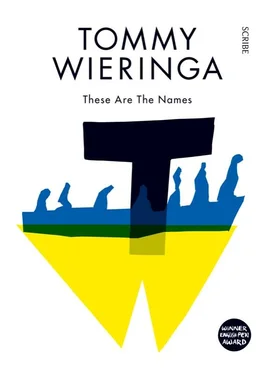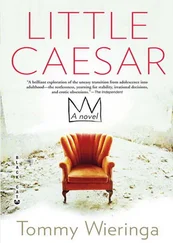So much had come back to him since he’d developed a cold foot. In dreams and musings he had relived episodes and places. There was no direct connection between his cold foot and his memories, although you might also say it started with that cold foot, and now here he sat with a pile of books, studying Judaism.
It was after midnight. The radio had been silent the whole time.
Polanen Street grew accustomed to the white Lada parked at the curb. Even the Asians had stopped being startled by the policeman in the alleyway. A plastic sack in hand, Beg stood waiting at the bottom of the steps to the synagogue. He often brought along tea and cookies for the old man. One discussed matters of faith along with sweet cookies and aromatic black tea from Krasnodar.
He wanted the rabbi to tell him why a convert could never completely become a Jew, but always remained inferior.
‘There are different views on that subject,’ the rabbi said, once they were seated at the kitchen table.
‘I was afraid of that,’ Beg said despondently.
‘Generally speaking, the opinion you expressed is one found mostly among the orthodox.’
‘I read Halevi’s book.’
‘The great Halevi.’
‘I finished it last night.’
‘An important work.’
‘He says that, too.’
‘I agree with him,’ the rabbi said. ‘The proselyte is a 99 per cent Jew. There is still something missing.’
‘A prophetic element, that’s what he calls it.’
‘That has been passed down to us from our forefathers. From Adam to Seth, from Lamech to Noah, from Abraham to Isaac and from Isaac to Jacob. From Jacob to his sons. Moses and Aaron carried the light through the desert for forty years, and passed it on to their heirs. How could a gentile possess that light? After all, he’s not related to the patriarchs.’ He looked up. ‘Inferior, you said. When you say that, you’re engaged in polemics. All I’m saying is that it’s a trait that can only be passed on by inheritance, the way red hair shows up in some families and never in others.’
Beg closed his eyes; he had to think hard about this. ‘In fact, what you’re saying … is that a distance remains. The prophets are Jewish, they are close to God. He gives them their visions. The proselyte doesn’t possess that sensitivity; he can get close, but never make it all the way. That 1 per cent, that’s the distance God maintains between himself and the non-Jew. And that cannot be bridged.’
‘God is close to us, so that applies the other way around, too. The goy can cross the bridge, but never reach the other side. Rabbi Halevi in Andalusia and Reb Eder in Michailopol are in agreement on that. Would you like some more tea? You always bring tea with you — I assume you’re extremely fond of tea?’
Beg nodded.
‘Don’t you see that?’ the rabbi said. ‘That’s precisely what makes it so hard for others to bear. God who watches over us and sends plagues to Egypt, who shows us the way in a pillar of cloud and a pillar of fire, and talks to us on Mount Sinai — what a pact! What a pronouncement!’
He poured some more hot water into the cups. It was the little movements that caused his hands to shake most.
‘When a father has a favourite son,’ he said with his back to Beg, ‘it always leads to jealousy in the household. Jacob loved Joseph most dearly — his brothers tried to kill him. Jealousy! Joseph also had a prophet’s dreams; he dreamed the truth that was yet to come. The prophetic element had been passed on to him, and even though he was persecuted, it’s not easy to extinguish a light like that. His light shone from the dungeon all the way to the pharaoh’s chambers …’
Beg remembered the Old Testament stories that his mother had read aloud to him and to his sister — most of them had coagulated into a mood, a couple of names, half-histories, but he remembered the story of Joseph in the well, and the storehouses he built for the pharaoh to stockpile grain for the lean years to come.
‘The first thing you need to do is read the Torah,’ the rabbi said. His breathing sounded laboured. ‘Everything is in there. The rest is interpretation.’
Hot tea splashed on his fingers when he put the glass on the table. ‘Moses never entered the Promised Land, but Joseph’s bones are buried there. He made the children of Israel vow not to leave his bones behind on the day of their return. They carried them with them in the desert for forty years, until they entered the Holy Land. Our memory is also what produces our faithfulness. But most of us … we won’t reach the Promised Land, not until the Last Day. You saw how I sprinkled some sand over Rabbi Herz’s grave? That was sand from Israel, a sign of our covenant. Our bones are scattered all over the world, just like Ezekiel saw in his dream:
Then he said unto me, Son of man, these bones are the whole house of Israel: behold, they say, Our bones are dried, and our hope is lost: we are cut off for our parts.
Therefore prophesy and say unto them, Thus saith the Lord God; Behold, O my people, I will open your graves and cause you to come up out of your graves, and bring you into the land of Israel.
And ye shall know that I am the Lord, when I have opened your graves, O my people, and brought you up out of your graves,
And shall put my Spirit in you, and ye shall live, and I shall place you in your own land: then shall ye know that I the Lord have spoken it , and performed it , saith the Lord.’
‘And see,’ the rabbi whispered, ‘they form an exceeding great army.’
He wrapped his crooked fingers around his glass and said in a thick voice: ‘I shall place you in your own land … I have spoken it, and performed it …’
CHAPTER TWENTY-FOUR.And then there were five
The tall man looked like an insect. He strode through the world on giant legs — a hundred thousand times life-size, his legs reaching to the sky. High up above there, you saw his face, the gloomy, drooping face, anticipating the disappointments life had in store for him. His footsteps left craters that filled with water. One by one, they drowned in his footsteps, struggling, sinking until they hit the bottom. Waving grass.
With that dream the boy had woken, lying on the soaked ground, in the rain that blew across the earth in gusts. He stood up. The sweat was beaded on his forehead; wobbling, he waited till the dizzy spells withdrew.
He lifted his nose to the wind like an animal. Out on the steppes his senses were piqued, a nervous sensitivity amplified by hunger and exhaustion. He left the circle of sleeping forms and walked to a rise in the landscape a little further along, a sort of dune. The sand slipped beneath his feet as he climbed. He looked around. At the edges of his vision the earth wavered, a flowing transition from earth to sky, like the misty spurs of a distant mountain range.
Then he hopped back down and searched amid the grass for something edible. He’d found the cadaver of a hare once. He had gnawed off the dried remains.
In smaller and smaller circles he wandered around the camp, until he saw the barrier of grass in which the black man took cover at night. He stopped. Within a short time the distance between them had become unbridgeable. Not long ago he had still been warming his hands at the same fire.
‘Hey!’ he called out faintly.
‘Hey, Africa!’ he shouted again after a few minutes, louder this time.
The boy picked up a stone and threw it at him. It landed beside him. He dropped to his knees and felt around on the ground for more stones, his eyes glued on the sleeping body. Fear and excitement coursed through his body when he hit his target. But the man slept soundly and did not move. The boy took a few cautious steps in his direction. ‘Hey, Africa!’ A few more steps. His torso was bare. The boy yelled, but the yell never passed his lips. In the sand lay a dead man. One eye socket was filled with blood; the other eye had burst and emptied. The boy forgot to breathe. Behind the torn lips he saw the splintered teeth. The blood had clotted, but deep inside the wounds the flesh was as red as his own.
Читать дальше











